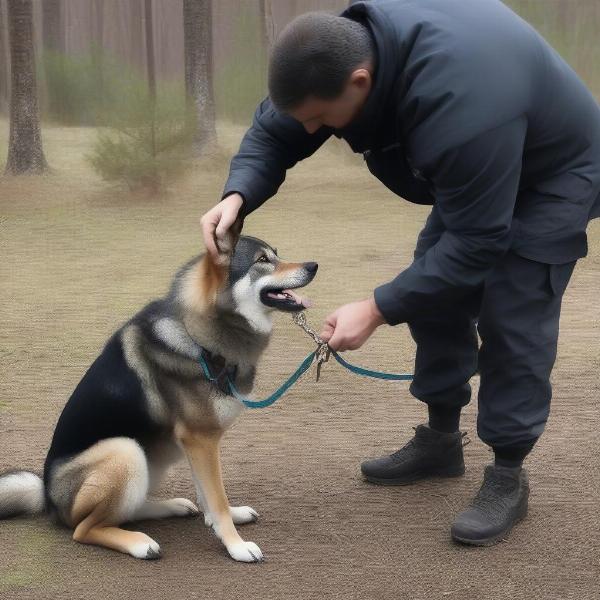Wolf dog collars are a popular choice for owners of powerful breeds, often drawn to their rugged aesthetic and perceived strength. However, selecting the appropriate collar for a wolf dog, or any dog with wolf-like characteristics, requires careful consideration beyond just looks. This article will delve into the key factors to consider when choosing a wolf dog collar, ensuring both the safety and comfort of your unique companion.
Understanding Your Wolf Dog’s Needs
Before diving into specific collar types, it’s crucial to understand the unique needs of a wolf dog. These dogs often possess a higher prey drive, greater strength, and a different sensitivity level compared to domesticated breeds. Therefore, a collar designed for a typical pet dog may not be suitable or safe. A poorly chosen collar can lead to escapes, injuries, or even exacerbate behavioral issues.
Choosing the Right Type of Wolf Dog Collar
Several collar types can be considered for wolf dog owners. Each has its pros and cons, and the best choice will depend on your individual dog’s temperament, training level, and activity level.
Martingale Collars
Martingale collars are a popular choice for wolf dogs due to their humane no-slip design. These collars tighten gently when the dog pulls, preventing escape without choking. This makes them a good option for dogs prone to pulling or slipping out of traditional collars.
Flat Collars
Flat collars, while suitable for everyday wear and ID tags, are generally not recommended for wolf dogs during training or in situations where they might pull. The risk of escape or injury from a flat collar is higher for these powerful breeds.
Prong Collars
Prong collars are a controversial option. While some trainers use them, they can be aversive and potentially harmful if used incorrectly. It’s crucial to consult with a professional dog trainer experienced with wolf dogs before considering this type of collar.
 Dog trainer fitting a prong collar on a wolf dog
Dog trainer fitting a prong collar on a wolf dog
Harness Options for Wolf Dogs
Harnesses provide more control and distribute pressure evenly across the dog’s body, making them a safer alternative to collars for strong pullers.
Front-Clip Harnesses
Front-clip harnesses discourage pulling by redirecting the dog’s forward momentum. This can be particularly beneficial for wolf dogs with a strong prey drive.
Back-Clip Harnesses
Back-clip harnesses are suitable for well-trained wolf dogs who walk calmly on a leash. They offer comfort and control without restricting the dog’s natural movement.
Material and Fit: Key Considerations
Beyond the type of collar, the material and fit are crucial. Opt for durable materials like nylon or leather that can withstand the strength of a wolf dog. Ensure the collar fits snugly but allows for two fingers to fit comfortably between the collar and your dog’s neck.
Training Your Wolf Dog with a Collar
Training is paramount when owning a wolf dog. Regardless of the collar you choose, consistent and positive reinforcement training is essential for establishing control and building a strong bond with your dog.
Conclusion
Choosing the right wolf dog collar is a crucial decision for any owner. By carefully considering your dog’s individual needs, understanding the different collar types, and prioritizing proper training, you can ensure both the safety and well-being of your powerful companion. Remember, a well-fitted collar is just one piece of the puzzle; responsible ownership, ongoing training, and a deep understanding of your wolf dog’s unique nature are essential for a harmonious relationship.
FAQ
- What is the best collar for a wolf dog that pulls? A martingale collar or a front-clip harness can be effective for wolf dogs that pull.
- Are prong collars safe for wolf dogs? Prong collars should only be used under the guidance of a professional trainer experienced with wolf dogs.
- What material is best for a wolf dog collar? Durable materials like nylon and leather are recommended.
- How should a wolf dog collar fit? Snugly, but with enough room for two fingers to fit between the collar and the dog’s neck.
- Is training important for a wolf dog? Absolutely, consistent training is essential for managing a wolf dog.
- Can I use a regular dog collar on a wolf dog? While possible, specialized collars like martingales or harnesses are generally safer and more appropriate.
- Where can I find more information about wolf dog care? Reputable breeders, wolf dog rescues, and experienced veterinarians can provide valuable information.
ILM Dog is your international resource for expert dog care advice, offering breed-specific guidance, health tips, training techniques, nutritional information, and much more. Whether you’re a first-time owner or a seasoned expert, ILM Dog provides reliable information to help you navigate every aspect of dog ownership. For further assistance, contact us via email at [email protected] or by phone at +44 20-3965-8624. Visit us online at ILM Dog for more resources on dog breeds, health, training, nutrition, grooming, and essential products.